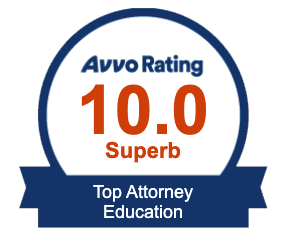On January 11, 2017, the United States Supreme Court heard oral arguments in the case of Endrew F. v. Douglas County School Dist. RE-1. For a copy of the oral argument see, https://www.supremecourt.gov/oral_arguments/argument_transcripts/2016/15-827_gfbh.pdf. The Court will decide this case by the end of June 2017. Endrew F. is the first case since Rowley , which was decided in 1983, to address what kind of benefit should a child receive under his IEP.
Why is this case important to families of children with disabilities? It is important because the Supreme Court may further define, change or modify what is considered “some” benefit for a child with a disability. In most jurisdictions, “some” benefit means more than de minimus. This is defined as to be so minor as to merit disregard; insignificant or important. What happens when you complain at an IEP meeting, or to a teacher, or a conference that your child is not making educational progress? Often educators will say something like your child is not guaranteed the best education or we only have to provide a Chevy and not a Cadillac to your child. Sometimes you hear that we only have to show he receives some benefit from his special educational instruction. As many of you know, the IEP is the centerpiece of the IDEA. The IEP’s goals and objectives must be objectively measured to determine whether your child is receiving some benefit from his special education instruction and services. But the IDEA as been amended several times since 1983. The IDEA now requires a child with a disability to be involved in and make progress in the general educational curriculum. 20 U.S.C. 1414(d)(1)(A)(i )(I).
The key questions for the Court are whether a child with disability making de minimus progress is legally consistent with the IDEA, as amended. Did Congress intend through its amendments to the IDEA require school system to raise the bar so that the child receives significant or meaningful benefits? Does the benefit have to be meaningful? Is “some” benefit too low of a bar in view of the recent changes and amendments to the IDEA? For those who has challenged an IEP in a due process hearing or through a state complaint know how hard it is to win. The judge or decision-maker will cite Rowley and other court cases that say the IDEA only requires the child to receive “some” benefit. This is a very low standard. Most school districts can easily meet this standard. Often you will hear that your child received benefits from his special education instruction. How do you measure that benefit? Well, you look at data, teacher observations, assessments and tests scores, and other factors to make this determination. But what if the standard was significant benefit? Wouldn’t that be a higher standard than just some or de minimus benefits? Probably so.
This is the Court’s decision in Endrew F. is very important to parents of children with disabilities. If the Court raises the bar to a “substantial” benefit so as to allow the child to make progress in the regular educational curriculum this would be very good. It would be easier for parents to show in a due process or court proceeding that their child did not make progress. It would require school districts to do more educationally for your child. They could not claim anymore that your child received just more than de minimus benefit from his IEP. Of course, there is no way to predict exactly what the Court will decide. I will revisit the Endrew F. case when the Supreme Court issues a decision. I will give you some analysis of the Court’s decision and how it may affect your child’s special education programming and services under his IEP.

